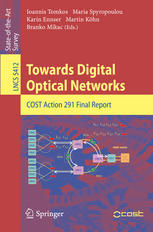

Most ebook files are in PDF format, so you can easily read them using various software such as Foxit Reader or directly on the Google Chrome browser.
Some ebook files are released by publishers in other formats such as .awz, .mobi, .epub, .fb2, etc. You may need to install specific software to read these formats on mobile/PC, such as Calibre.
Please read the tutorial at this link: https://ebookbell.com/faq
We offer FREE conversion to the popular formats you request; however, this may take some time. Therefore, right after payment, please email us, and we will try to provide the service as quickly as possible.
For some exceptional file formats or broken links (if any), please refrain from opening any disputes. Instead, email us first, and we will try to assist within a maximum of 6 hours.
EbookBell Team

4.1
100 reviewsThe explosive growth of data, particularly internet traffic, has led to a dramatic increase in demand for transmission bandwidth imposing an immediate requirement for broadband networks. The primary objective of the COST 291 Action "Towards Digital Optical Networks" was to focus on novel network concepts, subsystems and architectures to enable future telecommunication networks, exploiting the features and properties of photonic technologies.
Three working groups were established to deal with these research objectives:
WG1 "Optical processing for digital network performance", dealt with the physical layer and implementation related issues of transparent optical networks such as optical signal per bit processing, optical switch architecture designs and implementations as well as transmission related issues.
WG2 "Novel network architectures", focused on the evolution of network scenarios including novel network architectures. Also different node architectures and technologies in terms of network performance and functionality were investigated. Three different architectures were studied and compared: circuit (wavelength, waveband, etc.), optical burst and optical packet switched networks.
WG3 "Unified control plane, network resilience and service security", dealt as well with the impact of transparency on photonic network architectures and the associated control and protocol issues as on network survivability and security issues, covering topics such as protection and restoration, its impact on routing and wavelength assignment algorithms, fault isolation, disaster recovery, etc.
The results obtained within these working groups are collected in this volume.